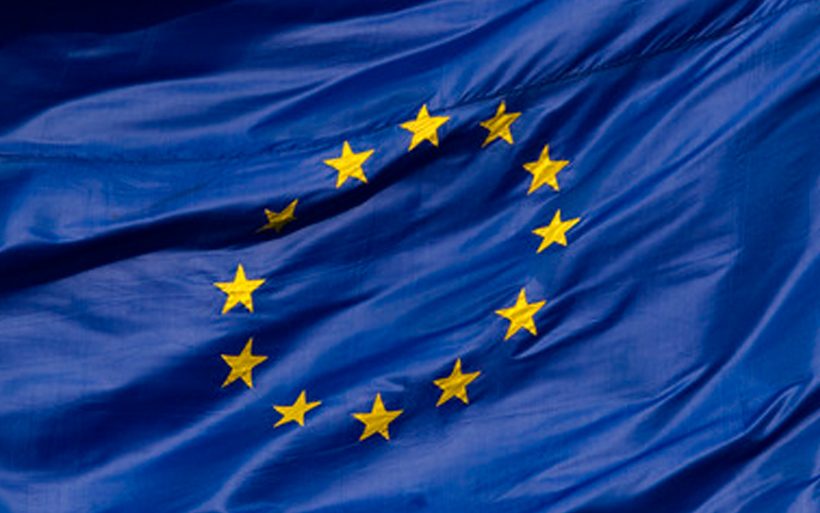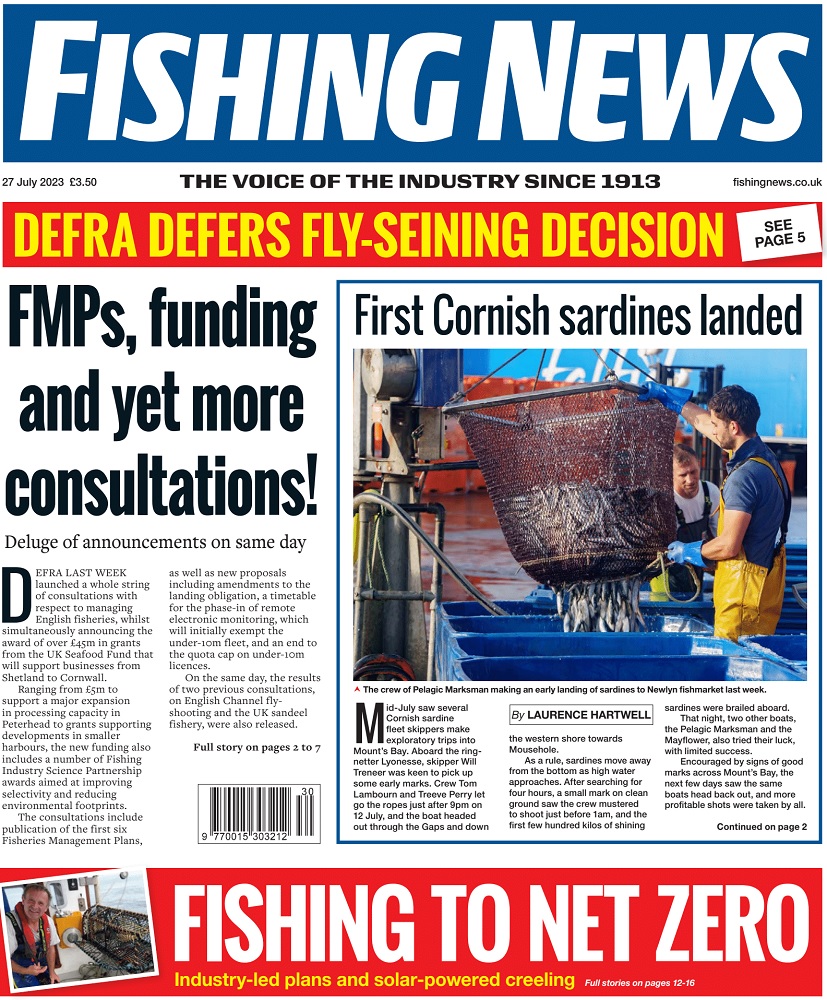A Scottish fishermen’s leader says the forthcoming referendum on whether the UK should stay in or leave the EU raises some important issues for the fishing industry, reports Tim Oliver.
He is urging the UK and Scottish governments in particular to negotiate genuine and meaningful regional control of EU fisheries policy in the negotiations on Britain’s relationship with the EU that are now underway.
“The problem at the moment is that legally the EU retains competence over the management of all living marine resources in EU waters,” SFF chief executive Bertie Armstrong told Fishing News.
“This means that despite the ‘regionalisation’ of the CFP under the recent reforms, executive competence remains at the centre, in Brussels.
“That in turn means that the advisory committees that replaced RACs can only be what the title says – advisory.
“They cannot be genuine regional management bodies that would give real decentralised management because legally the EU cannot allow them to be.
“Brussels legally has to be in control.”
He said such change could be negotiated as part of the wider demands in the talks for a general repatriation of powers from Brussels, allowing national governments to block EU legislation and reduce red tape.
Armstrong claims years of “micro-management” from Brussels have been “a disaster” for Scottish fishing and fisheries should be managed regionally, with “regional management for regional issues”.
“We would urge the UK and Scottish governments to pursue in the negotiation process the changes necessary to give proper regional control,” said the SFF chief.
He said that compared with the passions aroused over the recent referendum on Scottish independence, the forthcoming referendum on UK membership – due in 2017 or even 2016 – was “quiet”, but it was of fundamental importance for the fishing industry.
He pointed out that if the UK voted to withdraw from the EU there would be an “immediate, fundamental change” for the industry.
“The UK’s long-lost control over the greater part of the northern European fishing grounds would be restored,” said Bertie Armstrong.
“Like Norway, Iceland and the Faroes, the UK would set its own fishing opportunities and negotiate its own agreements with the other coastal states and with the EU.”
But he said that while this was a fact and “instinctively sounds like a very good thing”, it was not necessarily a decisive argument in favour of withdrawal.
There were other elements to consider and there would need to be “a positive balance” between the gain from leaving the EU and the other effects, such as the need to renegotiate reciprocal fishing and marketing terms with the EU and third countries such as Norway in particular.
Another issue to consider was whether the UK and Scottish governments would make a better job of managing fisheries than the EU.
“Part of the problem is that, however much we may dislike the thought, the reality is that fishing and the fishing industry is not a major economic force in the UK or even the Scottish economy.
“It is extremely important in, say, Newlyn, or Lerwick or other ports, but in the overall scheme of things it is a very small proportion of GDP, and that in turn makes the industry politically weak.”
The SNP has already signalled that it would call another Scottish independence referendum if there was a UK vote to leave the EU, because the SNP wants Scotland to remain in the EU.
But Armstrong is critical of the SNP’s stance and record on fishing since it came to power.
“When Alex Salmond was in opposition he joined fleets of fishing boats sailing up the Firth of Forth in protest at EU fisheries policies, he argued strongly in Westminster against the CFP and proclaimed loudly that the Tories had ‘sold us down the river’ when they took us into the EU and collective 200-mile limits and the CFP.
“But since the SNP came to power they have had seven years to do something about the CFP and they’ve done nothing.
“The referendum is a fundamentally important issue for the fishing industry and all fishermen will need to carefully consider the balance of the benefits of staying in the EU or leaving when they cast their vote.”


A Scottish fishermen’s leader says the forthcoming referendum on whether the UK should stay in or leave the EU raises some important issues for the fishing industry, reports Tim Oliver. He is urging the UK and Scottish governments in particular to negotiate genuine and meaningful regional control of EU fisheries policy in the negotiations on Britain’s relationship with the EU that are now underway. “The problem at the moment is that legally the EU retains competence over the management of all living marine resources in EU waters,” SFF chief executive Bertie Armstrong told Fishing News. “This means that despite the ‘regionalisation’ of the CFP under the recent reforms, executive competence remains at the centre, in Brussels. “That in turn means that the advisory committees that replaced RACs can only be what the title says – advisory. “They cannot be genuine regional management bodies that would give real decentralised management because legally the EU cannot allow them to be. “Brussels legally has to be in control.” He said such change could be negotiated as part of the wider demands in the talks for a general repatriation of powers from Brussels, allowing national governments to block EU legislation and reduce red tape. Armstrong claims years of “micro-management” from Brussels have been “a disaster” for Scottish fishing and fisheries should be managed regionally, with “regional management for regional issues”. “We would urge the UK and Scottish governments to pursue in the negotiation process the changes necessary to give proper regional control,” said the SFF chief. He said that compared with the passions aroused over the recent referendum on Scottish independence, the forthcoming referendum on UK membership – due in 2017 or even 2016 – was “quiet”, but it was of fundamental importance for the fishing industry. He pointed out that if the UK voted to withdraw from the EU there would be an “immediate, fundamental change” for the industry. “The UK’s long-lost control over the greater part of the northern European fishing grounds would be restored,” said Bertie Armstrong. “Like Norway, Iceland and the Faroes, the UK would set its own fishing opportunities and negotiate its own agreements with the other coastal states and with the EU.” But he said that while this was a fact and “instinctively sounds like a very good thing”, it was not necessarily a decisive argument in favour of withdrawal. There were other elements to consider and there would need to be “a positive balance” between the gain from leaving the EU and the other effects, such as the need to renegotiate reciprocal fishing and marketing terms with the EU and third countries such as Norway in particular. Another issue to consider was whether the UK and Scottish governments would make a better job of managing fisheries than the EU. “Part of the problem is that, however much we may dislike the thought, the reality is that fishing and the fishing industry is not a major economic force in the UK or even the Scottish economy. “It is extremely important in, say, Newlyn, or Lerwick or other ports, but in the overall scheme of things it is a very small proportion of GDP, and that in turn makes the industry politically weak.” The SNP has already signalled that it would call another Scottish independence referendum if there was a UK vote to leave the EU, because the SNP wants Scotland to remain in the EU. But Armstrong is critical of the SNP’s stance and record on fishing since it came to power. “When Alex Salmond was in opposition he joined fleets of fishing boats sailing up the Firth of Forth in protest at EU fisheries policies, he argued strongly in Westminster against the CFP and proclaimed loudly that the Tories had ‘sold us down the river’ when they took us into the EU and collective 200-mile limits and the CFP. “But since the SNP came to power they have had seven years to do something about the CFP and they’ve done nothing. “The referendum is a fundamentally important issue for the fishing industry and all fishermen will need to carefully consider the balance of the benefits of staying in the EU or leaving when they cast their vote.”




